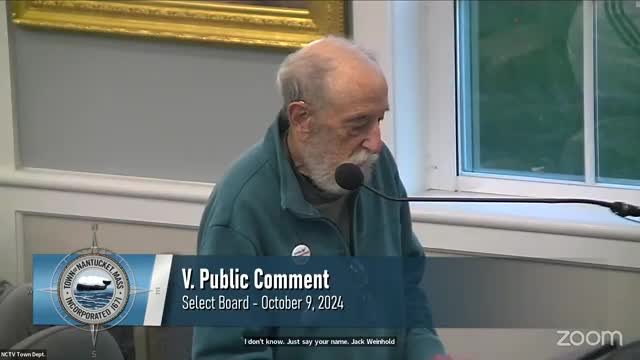Island's Drinking Water at Risk from Contaminated Rain Runoff
October 09, 2024 | Nantucket County, Massachusetts
This article was created by AI summarizing key points discussed. AI makes mistakes, so for full details and context, please refer to the video of the full meeting. Please report any errors so we can fix them. Report an error »

During a recent government meeting, critical discussions emerged regarding environmental concerns and energy strategies on Nantucket. A speaker highlighted the historical use of rain barrels for drinking water, noting that current rainwater is now unsafe due to contamination from industrial and vehicular emissions. However, the island's natural sand filtration system allows rainwater to recharge the drinking water aquifer safely.
The speaker emphasized the legal requirement that if more than 15% of a property is covered by impervious surfaces, stormwater runoff must be treated to remove contaminants before it enters the ground. This issue is particularly pressing with high-density housing developments, such as Surfside Crossing, which pose significant stormwater runoff challenges. The speaker urged the board to establish a stormwater action group to develop a plan to prevent aquifer contamination.
In another segment, a representative from ACT for Whales expressed concerns about offshore wind projects, questioning their effectiveness in combating climate change. They referenced documents from ISO New England that suggest these projects may not provide the anticipated benefits and could require building significantly more energy capacity than necessary. The representative argued that the reliance on offshore wind could lead to increased natural gas usage and called for a reevaluation of the energy strategy in light of these findings.
The discussions underscored the need for a balanced approach to environmental management and energy production on the island, highlighting the importance of adhering to legal standards while also considering the long-term implications of energy projects.
The speaker emphasized the legal requirement that if more than 15% of a property is covered by impervious surfaces, stormwater runoff must be treated to remove contaminants before it enters the ground. This issue is particularly pressing with high-density housing developments, such as Surfside Crossing, which pose significant stormwater runoff challenges. The speaker urged the board to establish a stormwater action group to develop a plan to prevent aquifer contamination.
In another segment, a representative from ACT for Whales expressed concerns about offshore wind projects, questioning their effectiveness in combating climate change. They referenced documents from ISO New England that suggest these projects may not provide the anticipated benefits and could require building significantly more energy capacity than necessary. The representative argued that the reliance on offshore wind could lead to increased natural gas usage and called for a reevaluation of the energy strategy in light of these findings.
The discussions underscored the need for a balanced approach to environmental management and energy production on the island, highlighting the importance of adhering to legal standards while also considering the long-term implications of energy projects.
View full meeting
This article is based on a recent meeting—watch the full video and explore the complete transcript for deeper insights into the discussion.
View full meeting
